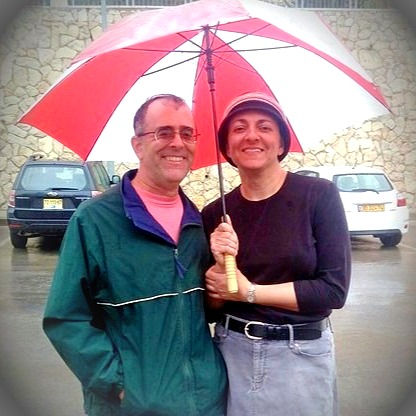WEATHER: Worries and Storms In A Coronavirus Winter
- Dr. Barry Lynn
- Mar 9, 2020
- 3 min read

Illustration: Spring In Gush Etzion (Image Credit: Dr. Barry Lynn © 2020)
There seems a lot to worry about — and the forecasts for the end of the week have added to these worries.
As noted in our previous column, the weather pattern has been "stuck" in the positive phase of the Arctic and North Atlantic Oscillation — and both patterns have been combining to bring periodic storms, many of which have spent a good part of their lifetimes over the moist and relatively warm Mediterranean Sea.
Thus, after a warm Purim with a chance of scattered showers, the weather will change for the worse.
About mid-week, a deep trough will drop southward passing east of Italy and west of Crete. It is part of a ridge-trough couplet stretching from western to central Europe. The trough will cut-off from the polar jet and move through Egypt and into the northern Sinai by Friday morning. Two of the three global ensemble forecast models predict the storm to then reconnect with the polar jet, strengthening as it moves into the southern/eastern part of the Mediterranean Sea. The more this system merges with the polar jet, the heavier and more severe our weather will be.
Moreover, the southern trajectory of the storm means that there will be plenty of dust ingested into the storm, including some upper level Atlantic Ocean moisture. Together, plenty of moisture and dust suggests that thunderstorms will be more intense than typical winter-thunderstorms, and that many places will surpass the 25 mm amounts measured in southern and eastern areas during our last storm. Storms should again also impact the southern areas quite heavily.
The heavy rains, strong winds, thunder and hail should last from Friday into Sunday morning.
The arrival of the storm at the end of the week seems pretty certain. What is less certain is how many people will become sick from coronavirus COVID-19. The United States CDC has a list of symptoms to be aware of including cough and high fever, as well as other helpful facts.
I'd like to dispel a pernicious and dangerous myth that seems to be spreading among some circles: that the coronavirus is not as dangerous as the common flu. Right now, about 3% of those infected are dying from the virus, which makes it more deadly on a percentage basis than the Spanish Flu of 1917/18. The reason some give for its supposed lack of lethality is that there are "probably" many more people who are carriers or just had light symptoms that we never hear about.
This idea is absurd because it is just as likely that there were people who were carriers of the Spanish Flu or only had light symptoms. However, the reason that tens of millions died was because it spread from place to place and occurred at a time when containment of the flu was hindered by the conditions during World War I (and the malnutrition that went with it).

The Israel Ministry of Health, including its deputy head Rabbi Yaakov Litzman, deserves high praise for its efforts to limit the spread of the virus. The current rules suspending flights and quarantining travelers and those suspected of having the disease just might, just might save millions.
But, for this to happen, each person must do his or her part.
Wash your hands with soap and water, frequently during the day, especially upon return home and before eating (and of course after using the bathroom).
Consider using an alcoholic hand cleaning solution when out, especially after touching door knobs, tables, grocery carts, etc, touched by others.
Try not to touch your face, mouth, and eyes with your fingers.
Try not to open doors with your hands.
STAY HOME: if you have symptoms, don't spread it to someone else because then it can spread EXPONENTIALLY from there.
As the Rabbi of our Synagogue recently wrote, saving a life is more important than other obligations we might have, including public prayer, and this is one of those times when we can save not just our own lives, but the lives of many others.

Dr. Lynn is a lecturer at The Hebrew University of Jerusalem, Earth Sciences Department. He is also CEO of Weather It Is, LTD, a company that specializes in reducing weather risk. Click here to read more of this writer’s work in The Jerusalem Herald.



































Comments